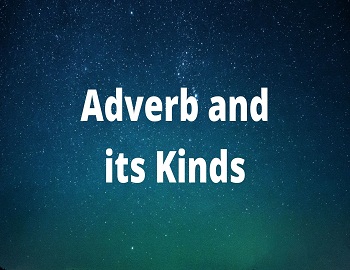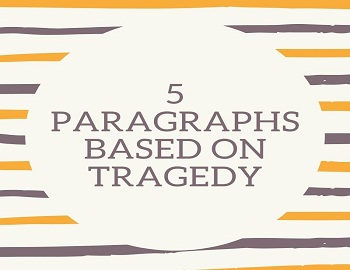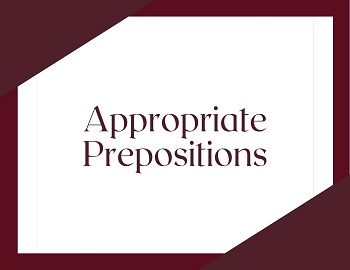Table of Contents
Adverb and its Kinds:
What is Adverb?
An Adverb is a word that qualifies or modifies any part of speech except an Article, a Noun or a Pronoun; as,
- I will move (Verb) slowly (Adverb).
- It is very (Adverb) cold (Adjective).
- She is doing her work very (Adverb) silently (Adverb).
- The bird flew exactly (Adverb) over (Preposition) our heads.
- A man is happy only (Adverb) when (Conjunction) he is in sound health.
Kinds of Adverbs:
Adverbs are of three kinds-
(1) Simple Adverbs modify the meanings of the words with which they are used. They are classified as follows-
(i) Adverb of Time- The word that denotes when the action has taken place is called an Adverb of Time; as,
- She will soon arrive.
- I did it today.
- Wasted time never returns.
- I have seen him before.
Chief Adverbs of Time- Now, then, before, after, today, yesterday, tomorrow, ago, since, already, daily, ever, never, presently, at once, etc.
(ii) Adverb of Frequency- The word that shows how often an action takes place is called an Adverb of Frequency; as,
- She often commits mistake.
- I called on him twice.
- He seldom visits us.
- I always try to do the best.
Chief Adverbs of Frequency- Once, twice, thrice, four times, often, seldom, frequently, always, rarely, repeatedly, etc.
(iii) Adverb of Place- The word that denotes where an action has taken place is called an Adverb of Place; as,
- Stand here.
- Go out.
- I searched him everywhere.
- Walk forward.
Chief Adverbs of Place- In, out, here, there, near, far, away, within, without, indoors, outdoors, up, down, etc.
(iv) Adverb of Manner- The word that denotes how or in what manner an action takes place is called an Adverb of Manner; as,
- He speaks clearly.
- She walks slowly.
- The Indian soldier fights bravely.
- She writes neatly.
This type of Adverbs are too many. All those words that are originally adjectives if end in ‘ly‘ form Adverbs of Manner.
(v) Adverb of Quantity or Degree- The word that denotes how much, to what degree or to what extent an action is taking place is called an Adverb of Quantity; as,
- She is too tired.
- I am fully satisfied.
- The work was partially done.
- The job is almost completed.
The word in bold type in the above sentences are Adverbs of Quantity.
Chief Adverbs of Quantity- Partly, fully, completely, almost, altogether, enough, too, much, little, quite, rather, etc.
(vi) Adverbs of Comparison- Adverbs that establish comparison are called Adverbs of Comparison; as,
- I am taller than you.
- You are not so tall as I am.
- He is as wise as Solomon.
(vii) Adverbs of Cause or Effect- The words that speak for cause or effect of an action are called Adverbs of Cause or Effect; as,
- He ran fast, therefore, he is out of breath.
- She worked hard, hence she stood first in the class.
Chief Adverbs of Cause or Effect- Hence, therefore, consequently, accordingly, etc.
(2) Interrogative Adverbs- Adverbs which are used in asking questions are called Interrogative Adverbs; as,
- Why do you go there?
- How do you do?
- Where will you go?
Chief Adverbs of this class are- how, when, where, why, how long, how often, whence, etc.
(3) Relative Adverbs- These Adverbs modify the meaning of Verbs, Adjectives and Adverbs. They also serve as conjunctions. They are the same as Interrogative Adverbs, but they do not ask questions; as,
- I do not know why he has gone there.
- We received him at the station when he came to see us.
Formation of Adverbs:
(1) Adverbs are mostly formed from Adjectives by adding ‘ly‘ to them; as, slowly, carefully, hastily, patiently, etc.
(2) A few Adverbs are formed from other words in an irregular way; as, abroad, asleep, awake, ahead, aloud, aside, today, tomorrow, yesterday, upward, backward, forward, etc.
(3) Some Adverbs have the same form as the corresponding Adjectives; as, fast, hard, long, early, late, much, back, very, only etc.









Comments (No)